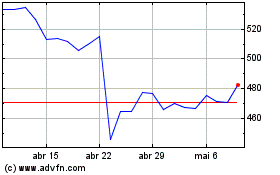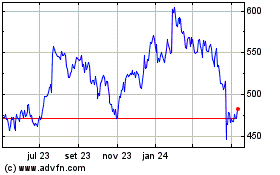By Rob Curran
This article is being republished as part of our daily
reproduction of WSJ.com articles that also appeared in the U.S.
print edition of The Wall Street Journal (February 15, 2019).
The bankruptcy filing by PG&E Corp. is the latest stumble by
a company rated highly by environmentally focused investors,
further exposing a weakness in a scoring system meant to measure
risk for shareholders.
The California utility's moves over the past 10 years to rely
more on renewable energy sources such as wind and solar resulted in
high scores on environmental, social and governance metrics, which
are considered by many investors to be a positive factor in
choosing a stock and used by others to manage risk.
What the ratings couldn't predict is that the stock would lose
nearly 70% of its market value since early November, as investors
worried about potential liabilities for the role PG&E's
equipment may have played in multiple wildfires. The company filed
for bankruptcy protection on Jan. 29.
The Global Sustainable Investment Alliance, an industry group,
estimated that between 2014 and 2016, assets invested with ESG and
other sustainable-investing goals in mind rose 25% to $22.89
trillion. Even as the world's biggest asset managers pile into ESG,
the ratings and analysis that underpin sustainable investment
scores remain more art than a science.
The data are often self-reported, and there can be blind spots,
like those revealed when companies such as PG&E, Volkswagen AG
and Facebook Inc. ran into trouble.
"These data providers almost have an impossible task in front of
them" because it isn't standardized, said George Serafeim, a
professor at Harvard Business School. "The whole field is very
messy."
Index and research firm MSCI Inc. and data-analysis company
Sustainalytics, partly owned by Morningstar Inc., are among the
leading providers of ESG ratings. The firms say their scores
quantify risks presented by key issues in all three ESG categories
and how companies manage those risks. MSCI also factors a company's
opportunities in ESG, or possible positive impacts on its business,
into its rating, something that Sustainalytics has stopped doing
for its primary rating.
Both firms evaluate companies on a broad range of issues. Under
the heading of environmental, for example, MSCI and Sustainalytics
assess corporations on issues such as carbon emissions,
raw-material sourcing and climate-change vulnerability.
"Many of today's ESG strategies utilize generic and sometimes
not transparent metrics of what it means to be a good corporate
citizen," said Ethan Powell, founder of Impact Shares, which offers
exchange-traded funds aligned with the values of various
nonprofits. It "contributes to the lack of adoption within the
broader investing public."
Impact Shares works with Sustainalytics, along with other data
sources and tools, to annually screen companies for its funds, two
of which include PG&E.
As of November 2018, Sustainalytics rated PG&E in the top
10% of its peers in the environmental category, and the firm had
singled the California utility out in 2017 as one of 10 companies
world-wide best positioned to take advantage of emerging ESG
trends.
Sustainalytics has since said that rating was assigned under an
old methodology. Beginning in September, it has concentrated its
primary ratings on assessing risk. The firm also said that in
reports before the Camp Fire broke out on Nov. 8, it had flagged
the risk of controversy.
Investigators are still working to determine what started the
wildfire, which killed 86 people, but PG&E has disclosed that
one of its high-voltage transmission lines malfunctioned in the
area about 15 minutes before the fire started.
PG&E isn't the only high-rated company that has faced an
ESG-related selloff in the past year. Facebook shares have fallen
more than 20% since its peak over the summer, a decline that many
analysts attribute to its handling of a data-privacy
controversy.
Facebook has long been among the top five holdings in the
largest U.S. fund based on an ESG index, the iShares MSCI KLD 400
Social exchange-traded fund. The KLD Social fund traded roughly in
line with the broad market during the selloff in the second half of
2018.
Facebook has admitted to mistakes on sharing users' data and
apologized for a failure to move quickly enough to deter
circulation of fake news on its network.
Linda-Eling Lee, global head of ESG Research at MSCI, said the
firm's ratings account for how Facebook manages data-privacy
concerns relative to its peers.
Similarly, Volkswagen was historically viewed as a strong ESG
company before the 2015 disclosure that the German auto maker
systematically cheated on emissions tests. In that case, MSCI
raised governance concerns about the firm ahead of the scandal and
later attributed "Dieselgate" to Volkswagen's mismanagement.
Volkswagen admitted in 2015 to rigging nearly 11 million
diesel-powered vehicles with test-cheating software.
An investor who bought Volkswagen shares in April 2015 would
show a loss of more than 35% on the investment.
Some call those companies outliers and point to numerous studies
that have found that companies with high ESG scores tend to
outperform.
Bank of America Merrill Lynch in 2018 found that by investing in
companies with above-average scores, investors could have avoided
90% of bankruptcies between 2005 and 2017.
But there is a low level of agreement between MSCI and
Sustainalytics scoring, Mr. Serafeim said. He noted a less than 50%
correlation in scores provided by different ratings firms on the
same stocks.
ESG-minded investors are perhaps best served by pairing the
ratings with other sources. Mr. Serafeim has tracked scores
alongside sentiment about the companies.
Not everyone has the time to find ways to address the
shortcomings of ESG ratings, however.
"It's not that we think it's a bunch of baloney -- we don't,"
said Oliver Pursche, chief market strategist at broker-dealer and
money manager Bruderman Brothers. "Our employees only have so many
hours in a day...We'd rather have them go through a company's
balance sheet, the business outlook, the income statement."
Robert Barba contributed to this article.
Write to Rob Curran at robert.curran@wsj.com
(END) Dow Jones Newswires
February 15, 2019 02:47 ET (07:47 GMT)
Copyright (c) 2019 Dow Jones & Company, Inc.
MSCI (NYSE:MSCI)
Gráfico Histórico do Ativo
De Jun 2024 até Jul 2024

MSCI (NYSE:MSCI)
Gráfico Histórico do Ativo
De Jul 2023 até Jul 2024
